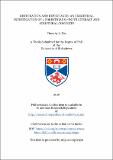Restoration and repentance : an exegetical investigation of 2 Corinthians 7 in its literary and scriptural contexts
View/
Date
21/06/2016Author
Supervisor
Keywords
Metadata
Show full item recordAltmetrics Handle Statistics
Abstract
This study demonstrates the logical coherence of 2 Corinthians 7:2–16 within the contexts of the canonical letter, the Old Testament, and Paul's Jewish contemporaries. Modern scholars have repeatedly pointed to this chapter as evidence for partitions in 2 Corinthians, arguing that Paul's appeal in 7:2–4 cannot fit with the resumed travel narrative in 7:5–16, since the latter appears to match so neatly with the narrative of 2:12–13. Even many of those scholars arguing for the epistle's integrity have stumbled at 2 Cor 7, often describing 7:5–16 as a kind of emotional afterthought, with little relation to 7:2–4. But we argue that 2 Cor 7:2–16 is best understood as part of the larger apology of chapters 2–6, especially with reference to the broader themes of the scriptural passages to which Paul appeals elsewhere in the letter in order to argue that God is at work through his ministry of the new covenant (e.g., Jer 31:31–34 + Ezek 36–37 in 2 Cor 3:6 and Isa 49:8 in 2 Cor 6:2). Understood within their larger contexts, these scriptural texts promise that Israel's restoration would be marked by God's unilaterally transforming his people's heart so as to make them truly repentant. Hence, Paul goes into such detail over his joy at the Corinthians' repentance because it is the tangible expression of the fact that they are truly his "recommendation letter," written by the Spirit (3:2–3). In other words, the Corinthians' repentance evidences Paul's legitimacy as an apostle of the promised new covenant, while also grounding his appeal for their contribution to his Jerusalem collection (chapters 8–9). Our study ends by showing that other Jewish authors made similar appeals to these scriptural texts in seeking to understand the restoration of Israel (especially as described in Deut 30), while also showing that these texts variously understood the relationship between the repentance of God's people and the transformation of their heart.
Type
Thesis, PhD Doctor of Philosophy
Collections
Items in the St Andrews Research Repository are protected by copyright, with all rights reserved, unless otherwise indicated.

